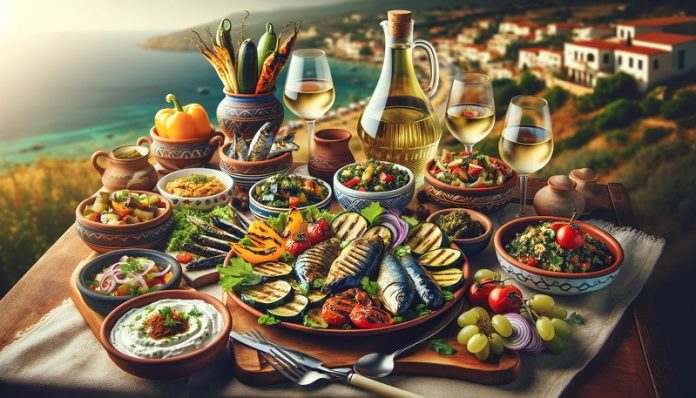
The Mediterranean diet is more than a way of eating—it’s a lifestyle that many people believe we’ve lost in today’s fast-paced world.
This diet, rich in olive oil, fresh foods, and whole grains, promises not only better health but also a happier and more connected way of life.
It’s about living actively, being part of a close-knit community, and enjoying the warmth of sunny days. And the best part? You can start by changing what’s on your plate.
In 2010, the Mediterranean diet was recognized by UNESCO as part of the world’s Intangible Cultural Heritage. This means it’s not just about food but also about preserving important cultural traditions.
The diet has been praised for its health benefits since the 1950s when people noticed that those living on the Greek island of Crete had fewer heart problems compared to others in Europe.
The Mediterranean diet encourages eating fresh, seasonal fruits and vegetables, whole grains, and, of course, lots of olive oil.
But it’s more than just what you eat—it’s about how you eat. According to UNESCO, the Mediterranean diet includes the knowledge, rituals, and traditions surrounding food, from how crops are grown to how meals are shared. Eating together is a key part of the culture, bringing families and communities closer.
While the Mediterranean diet is praised for its health benefits, it also highlights some of the problems in today’s society. Our modern way of living can make it hard to meet basic needs, like eating well and spending time with others.
Sociologist Claude Fischler talks about how our food system is in crisis, with issues like overeating, mindless snacking, and relying on ultra-processed foods. Many of us eat alone, often in front of a screen, instead of enjoying meals with others.
This contrast between the Mediterranean diet and modern life may explain why so many people are drawn to it. The diet represents a simpler, more balanced way of living that stands in stark opposition to the complexities of our globalized world.
Food isn’t just about nourishment; it can also reflect our fears and anxieties. Researcher Fabio Parasecoli describes a concept called “gastronativism,” where food is used in politics to define who belongs to a community. The Mediterranean diet, with its emphasis on tradition and local culture, can be seen as a response to the uncertainties of globalization, climate change, and other global challenges.
How people view the Mediterranean diet can vary depending on where they live. In Cilento, Italy, it’s seen as a way of life, deeply connected to local identity.
In Soria, Spain, it’s thought of more as a model for healthy eating. In Marseille, France, the word “diet” might make people think of restriction, but “Mediterranean” brings to mind organic and seasonal foods, showing a strong link to the food industry.
The Mediterranean diet is like a “sociocultural seismograph,” capturing the shifts happening in society. Whether viewed as a model for healthy eating, a lifestyle, or cultural heritage, it reflects our desire to find balance and meaning in a world that’s often out of balance.
As we look to this diet, we’re not just seeking better health but also a way to reconnect with the things that truly matter in life.
If you care about nutrition, please read studies about the best time to take vitamins to prevent heart disease, and vitamin D supplements strongly reduce cancer death.
For more information about nutrition, please see recent studies about plant nutrient that could help reduce high blood pressure, and these antioxidants could help reduce dementia risk.
Source: The Conversation.



